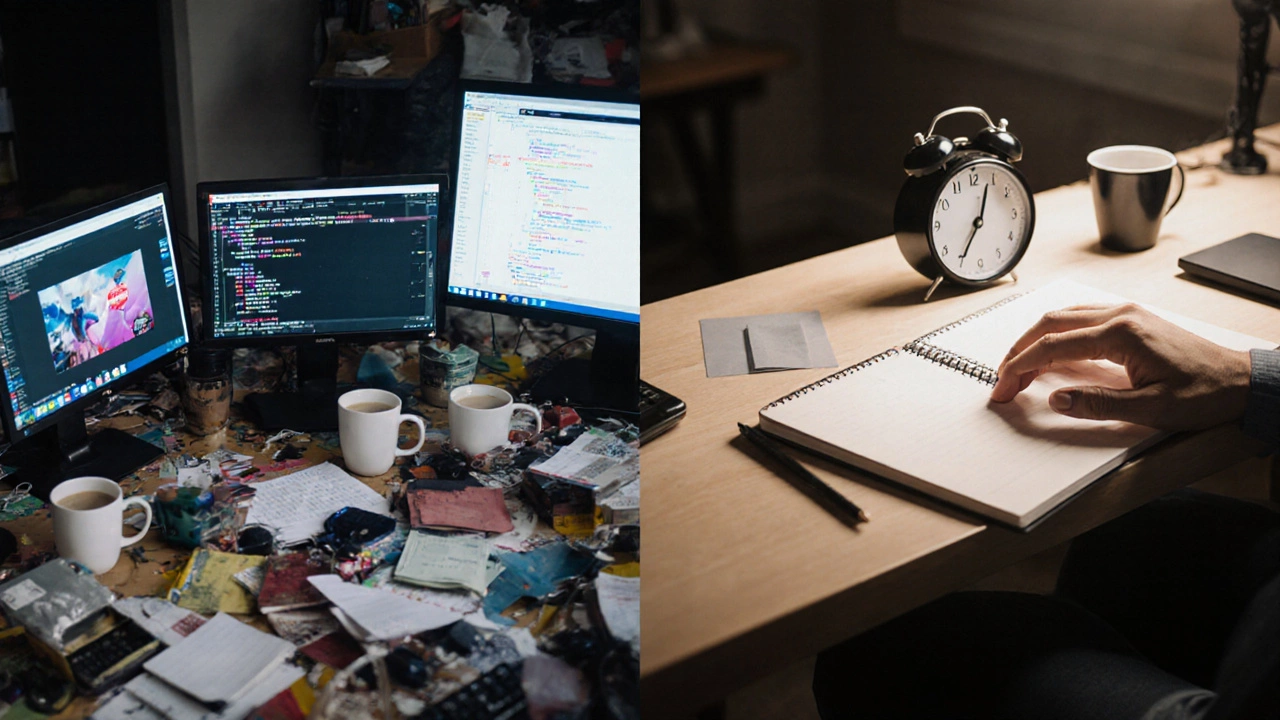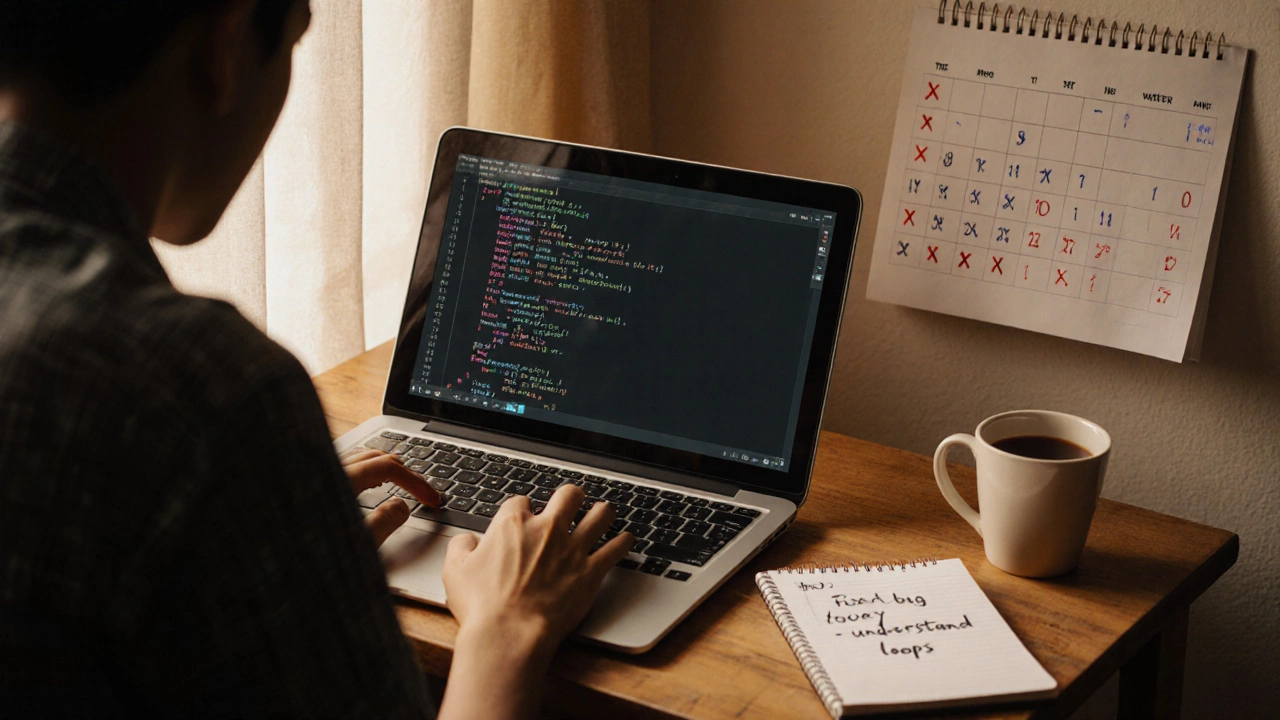Coding Practice Time Calculator
How Much Should You Practice?
This calculator helps you determine your optimal daily coding practice time based on your current skill level and goals. Based on research from UC Berkeley and real-world developer experiences.
If you're just starting out with coding, you've probably asked yourself: how many hours a day should I practice coding? There’s no magic number that works for everyone, but there are clear patterns that separate people who progress quickly from those who stall out after a few weeks. The answer isn’t about clocking in eight hours a day-it’s about consistency, focus, and how you use your time.
More isn’t always better
Some people think if they spend six or eight hours a day coding, they’ll become experts faster. That’s a myth. What actually happens is burnout. You start copying tutorials without understanding why things work. You get overwhelmed by error messages. You lose motivation because progress feels invisible. A 2023 study from the University of California, Berkeley tracked 400 self-taught coders over six months. Those who practiced 30 to 60 minutes a day, five days a week, were twice as likely to build a working project by the end of the period than those who crammed for four hours once a week.
Why? Because your brain needs time to consolidate learning. Coding isn’t like memorizing facts-it’s about building mental models. When you practice daily, even briefly, your brain keeps the concepts active. Skip a day? No big deal. Skip three? You’re starting over.
Beginners: Start with 30 minutes
If you’ve never written a line of code before, aim for 30 minutes a day. That’s it. Not an hour. Not two. Thirty minutes is enough to:
- Complete one small coding exercise on a platform like freeCodeCamp or Codecademy
- Build a simple webpage with HTML and CSS
- Write a function that adds two numbers in JavaScript
- Fix one bug in a program you wrote yesterday
That’s more than enough to build momentum. The goal isn’t to finish a course-it’s to make coding feel normal. Like brushing your teeth. You don’t need to spend an hour brushing to keep your teeth clean. Same with coding.
After two weeks, if you’re still excited and not dreading it, bump it up to 45 minutes. After a month, try an hour. But don’t force it. If you miss a day, don’t punish yourself. Just show up the next day.
What to do during those 30-60 minutes
Time spent coding isn’t the same as time spent learning. If you’re just watching videos or copying code without typing it yourself, you’re not practicing-you’re observing. Real practice means:
- Typing every line yourself, even if you’ve seen it before
- Breaking things on purpose and fixing them
- Reading error messages and trying to understand them
- Writing code without looking at the solution first
Here’s a simple daily structure that works for most beginners:
- Review yesterday’s code (5 minutes)
- Do one new exercise (20 minutes)
- Break something and fix it (10 minutes)
- Write down one thing you learned (5 minutes)
This isn’t glamorous. But it’s how people actually learn. No one becomes a coder by binge-watching YouTube tutorials. They become coders by struggling with small problems every day.

Intermediate coders: Aim for 60-90 minutes
If you’ve built a few projects, understand variables and loops, and can debug basic errors, you’re past the beginner stage. Now, the goal shifts from learning syntax to building fluency. That means spending more time on real projects-not tutorials.
At this level, 60 to 90 minutes a day is ideal. Use that time to:
- Work on a personal project (a to-do app, a weather widget, a simple game)
- Contribute to open-source projects on GitHub
- Refactor old code to make it cleaner
- Learn one new concept per week (like APIs, localStorage, or arrays)
Don’t jump to advanced topics just because you feel ready. Master the basics first. A lot of intermediate coders get stuck because they skip fundamentals like data structures and how functions actually work under the hood. You can’t build a house on a shaky foundation.
Advanced coders: Quality over quantity
If you’re already working as a developer or building complex apps, you don’t need to “practice” coding the way a beginner does. Your job is your practice. But if you’re learning a new language or framework-say, moving from JavaScript to Rust-you still need focused time.
For advanced learners, 45 minutes to an hour, three to four times a week, is enough. The key is deep work: no distractions, no multitasking, no YouTube in the background. Pick one hard problem. Solve it. Then explain it out loud, as if teaching someone else. That’s how you solidify knowledge.
What doesn’t work
Here are the habits that kill progress:
- Practicing for hours once a week
- Switching languages every month
- Following every tutorial you find online
- Waiting until you “feel ready” to start
- Comparing yourself to people who’ve been coding for five years
One person I know spent six months jumping between Python, Java, C++, and JavaScript. He never finished a single project. He thought he was learning more by trying everything. In reality, he was just avoiding the hard part: sticking with one thing until it stuck.

How to stay consistent
Consistency beats intensity. Here’s how to make coding a habit:
- Set a daily alarm for your coding time
- Code at the same time every day (morning works best for most people)
- Keep your coding environment simple: one editor, one browser tab, no distractions
- Track your streak on a calendar-mark an X for each day you code
- Join a small community (like a Discord group or local meetup) to stay accountable
Don’t rely on motivation. It fades. Rely on systems. A 30-minute daily habit is easier to keep than a 4-hour weekend binge.
Realistic timelines
Here’s what you can expect if you stick with 45 minutes a day, five days a week:
- 1 month: Build a simple website or app from scratch
- 3 months: Understand how data flows in a program
- 6 months: Solve coding interview questions on LeetCode
- 12 months: Apply for junior developer roles
That’s not fast. But it’s real. And it’s sustainable.
Final thought: It’s not about hours-it’s about attention
Two people can spend the same amount of time coding and end up in totally different places. One is focused, curious, and fixes mistakes. The other is distracted, frustrated, and gives up. The difference isn’t time. It’s attention.
So stop worrying about how many hours you’re logging. Start asking: Did I understand something new today? Did I solve a problem on my own? Did I make something that didn’t exist before? If the answer is yes, you’re doing it right.
Is 1 hour of coding a day enough to become a developer?
Yes, absolutely. One hour a day, five days a week, for a year will get you to a junior developer level if you’re focused and building real projects. Most bootcamps and tech companies expect candidates to have built a few personal projects-not to have logged 1,000 hours. Quality matters more than quantity.
Should I code every single day, even on weekends?
You don’t need to code every day. Rest days help your brain process what you’ve learned. Many successful coders take one or two days off each week. The goal is consistency over time, not daily perfection. If you miss a day, just get back on track the next day.
What if I only have 15 minutes a day?
Fifteen minutes is better than nothing. Use it to review code, fix a small bug, or read one documentation page. Don’t try to build something huge in that time. Focus on understanding one thing deeply. Over weeks, those 15-minute sessions add up to real progress.
Can I learn to code by practicing only on weekends?
It’s possible, but much harder. Coding skills fade quickly without regular use. If you only code on weekends, you’ll spend most of your Monday and Tuesday relearning what you forgot. Daily practice-even short sessions-keeps your brain in the right rhythm.
How long until I can get a job with this much practice?
Most people land their first coding job after 6 to 12 months of consistent daily practice. The key isn’t just time-it’s having 3-5 solid projects on GitHub, being able to explain how they work, and practicing coding interviews. If you’re putting in 45 minutes a day and building real things, you’ll be job-ready in under a year.

